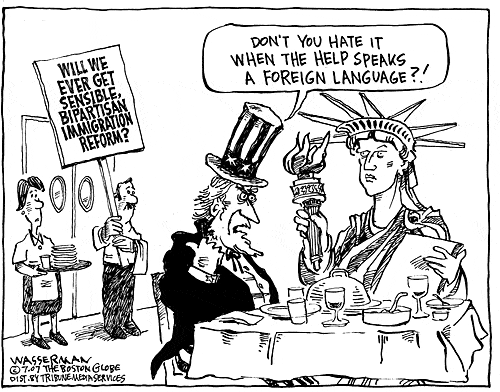For my Winter 2019 humanities course, Argument we studied the constitution. Within that, we focused on the amendments and bill of rights, my classmates and I studied different cases . We also learned how to set up a proper argument in unit one. We went to 2 different field experiences, the first one was going to the Citizenship and Naturalization Court downtown and towards the end of the term we had a great experience at a City Council meeting on Public Charge. Determining if you're liable to become a Public Charge is when you are likely to be dependent on the government for things such as food stamps or section eight, it denies immigrants citizenship because they would be a charge to the United States. This was an interesting field experience, we got to hear from a citizen called George Blakemore and he is an activist in Chicago.
 |
| Wasserman, Immigration Cartoon, 2019 |
I'm a fan of political comics, I think that this is relevant with the government and people who are very ignorant towards the immigration process so I think this is a good representation on how we need to change the immigration system.
For this Action project, I amended the naturalization test. The current test has 100 question with many opportunities to be right or wrong, meaning the questions weren't the most airtight and had a lot of options of answers. What I did was make my own test. I took questions off of the test and amended them, I chose the ones that I felt are the most important and tried to make them more frank.I also added a few scenario's about american citizenship that covers some of the question on the naturalization test but it makes it more practical to your everyday life.
Here are the four questions that I chose and how I amended them in bold.
Before: In what month do we vote for President?
What is the name of the President of the United States now?
After: What is the name of the President of the United States now? When were they voted in?
Before: 13. Name one branch or part of the government.
After: Name all 3 branches of government? What is one thing that each of them exclusively do?
Before: There are four amendments to the Constitution about who can vote. Describe one of them.
After: Describe the requirements for voting, according to the constitution.
Before: What is the economic system in the United States?
After: What is the economic system in the United States? What does that mean?
Here is my Argument.
Knowing something without context is useless.
Explanation is a good way to learn context.
The test should have more question that asks for explanation.
I think that this unit was very thought provoking and challenging. I had to use empathy and my knowledge of the US laws to create this test. There were many times that I felt under-qualified to make this and even intrusive because I know many people who are greatly affected by US immigration laws, I had to use different perspectives. My main inspiration for what I did was my teachers and I used my past experience on taking tests. I think that it was a useful project nonetheless.

